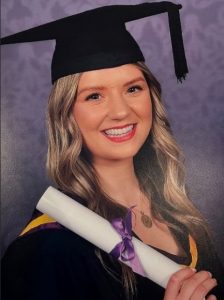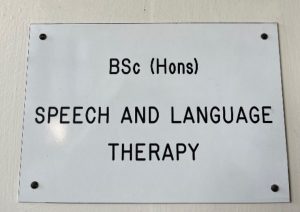Paediatric simulation clinics as a student vs. as a facilitator

Freya Mulderrig is currently a Specialist Speech and Language Therapist working at Lancashire & South Cumbria NHS Foundation Trust.
6 years ago I began my journey to a career in Speech and Language Therapy as a first year student at the University of Manchester. I was excited, nervous but most importantly very determined to qualify, I was itching to call myself a ‘Speech and Language Therapist’.
6 years on and I am 3 years into my career as a Specialist Speech and Language Therapist working in a Children’s Therapy Team. I continue to be excited and nervous every day, it truly is a job during which no two days are the same and your learning (and to do list) is never really complete.
Over the last 6 months I have had the opportunity to return to the university, not as a student but as a facilitator of their ‘Paediatric Clinical Simulations’, which make up some of the teaching of the ‘Clinical and Professional Practice’ module (one of my favourites as a student!)
The ‘Paediatric Clinical Simulations’ comprise of 4, 2 hour sessions, which were spent taking one child from their referral, through the information gathering and assessment process right up to intervention planning and feeding all of this back to a parent.

The sessions aimed to support students to understand what information gathering is, to start clinical assessment planning, to experience transcribing live assessments, to begin to analyse assessment findings and apply this analysis to the clinical decision making process before considering next steps and feeding back assessment findings and recommendations to a parent.
I remember vividly my own clinical simulation sessions during which I felt (just a tad) overwhelmed at the concept of considering and remembering all of the above. Which ironically is now something I do every single day. It has been a wonderful reflection opportunity to compare how I felt as a student to how I felt as a facilitator, and I wanted to share that with you in the hope that students will make the most of their studies and qualified therapists will remind themselves how important it is to support students to reach their full potential.
The beauty of clinical simulations is that, whilst it can be overwhelming at first to consider all that goes into supporting just one client, it’s a very safe learning opportunity during which group discussions help you to combine your own knowledge and experience with that of your peers.
It is also far less daunting to engage in a conversation with a familiar face pretending to be a client or a client’s parent than it may be to engage in a conversation with a ‘real life’ client or parent… trust me, this does get less scary with experience! It’s an opportunity to prepare for these conversations that inevitably will be arriving very shortly in the way of placements and future careers.
What I loved about the opportunity of the student’s feeding back to a ‘parent’ was that students were encouraged to work in pairs and each pair took a section on of the session to lead, so for instance one pair would lead on introductions, one would lead on explaining assessment results, one would lead on explaining intervention plan etc. This meant that these conversations were broken down into more manageable chunks and gave students a chance to prepare and feel really confident in feeding back the area they were leading on.
Remembering how I felt in these sessions as a student, gave me a slight advantage when facilitating them as it allowed me to remember that not so long ago I didn’t have the confidence which I now do to take a child from referral, through assessment and into intervention. It helped me create an environment in which I hope students felt relaxed and confident enough to collaborate and combine their individual experiences with each other and pair this with their theoretical knowledge, allowing them to independently consider how to manage the scenario.
Facilitating these sessions was a reminder that our peers and our colleagues will often reach different conclusions and provide alternative suggestions, all of which can be clinically justified. It is often from our peers and colleagues that we learn the most and it was so lovely to be surrounded by creative and enthusiastic students, who were so invested in their own learning as well as supportive of their peers.
More than anything, facilitating these sessions was a reminder at how far I have come since being a student. My experience at university prepared me so well for my career, however the curve of my learning and my skills really did sky rocket in my first few months and years as a working therapist and continues even now. Being able to share this with students was a privilege. I loved being able to reassure them that I was once sat where they were sat, thinking what they were thinking and dreaming about being able to call myself a ‘therapist’ instead of a student.
I felt great pride in feeling confident enough to stand in front of them and share my knowledge with them and reassure them that if they felt overwhelmed at how much there was to consider, I did too. It was wonderful to be able to recognise and point out the learning opportunity they had in front of them in the way of clinical simulation from the perspective of a qualified therapist as opposed to a student; I hope this helped them make the most of this opportunity and feel safe to have a go without the worry of “getting it wrong”.
So if you’re reading this as a student and you have some clinical simulation sessions coming up, please take my advice and really throw yourself into these sessions! You have far more to gain than you do to lose and you really do have a fantastic opportunity to practice your skills, whether it’s information gathering, transcribing assessments, writing notes, considering targets or feeding back to parents.
- Emma Ormerod’s Blog Post on the same topic.
- Farnworth V, Kleanthous I & Wenger-Trayner E (2016) Communities of Practice as a Social Theory of Learning: a Conversation with Etienne Wenger, British Journal of Educational Studies, 64:2, 139-160 – https://www.speechpathologyaustralia.org.au/SPAweb/Resources_For_Speech_Pathologists/Simulation-based_Learning_Program/
- Emma’s ITL Fellowship Project Report
- Simulation Rise Resource, by Emma Ormerod
- Simulation in Teaching ITL Fellowship Podcast







0 Comments